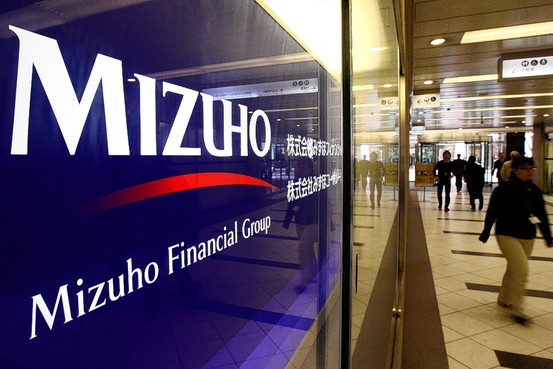Mizuho cautious on issuance after topping nomura

By Bloomberg
Mizuho Financial Group Inc., set to become the biggest underwriter of Japanese corporate bonds in 2014, is cautious on the outlook for next year as yields approaching zero percent put off investors.
Mizuho overtook Nomura Holdings Inc. earlier this month, managing 22.5 percent of 7.32 trillion yen ($61 billion) in sales excluding self-led issues, according to data compiled by Bloomberg. Deals decreased 3.3 percent from a year earlier. Billionaire Masayoshi Son’s SoftBank Corp. issued 1.1 trillion yen in notes to individuals this year to help fund acquisitions, accounting for 13 percent of total offerings.
The Bank of Japan’s increased bond buying since October has pushed average corporate yields to a record low 0.27 percent and four-year sovereign debt yields below zero, forcing top-rated issuers to offer extra premiums. Company notes are at risk of falling again next year if investors and sellers aren’t capable of finding mutually-acceptable terms, according to Mizuho.
“While it is going to be much more difficult than before under these very low interest rates, finding exactly the point that is satisfactory to both investors and issuers is going to be important,” Satoru Yamaguchi, a senior executive at Mizuho Securities Co., a unit of Japan’s third-largest bank, said in an interview. “With interest rates falling so far, we’ve hit a point in Japan where it is like ‘where do we go from here?’”
Japan’s 10-year sovereign yield dropped to a record 0.31 percent yesterday.
Top Underwriters
Mitsubishi UFJ Morgan Stanley Securities Co., a joint- venture of Morgan Stanley and Mitsubishi UFJ Financial Group Inc., Japan’s biggest bank, ranked third at 18.8 percent of deals, while Daiwa Securities Group Inc. was fourth at 16.7 percent.
Nomura, which underwrote 21.7 percent of this year’s total, was the leader from 2011 to 2013, according to data compiled by Bloomberg. Mizuho’s lead over Nomura is even greater when group company note offerings are included. Mizuho Financial, the holding company, and Mizuho Bank Ltd., the largest banking unit, sold 520 billion yen in debt this year, second only to SoftBank in terms of issuances.
Four-year Japanese government bond yields were at minus 0.01 percent yesterday, and yields as long as seven years were less than 0.1 percent. With the BOJ offering deposit-taking institutions an interest rate of 0.1 percent on excess funds placed with it, that level has become a floor for pricing regardless of previous credit spread levels. No corporate bond issuer has offered less than that this year.
Compensating Investors
Companies with high debt scores such as Sekisui House Ltd., graded AA by Japan Credit Rating Agency Ltd., and Nissan Motor Co.’s auto credit subsidiary both sold three-year bonds at 0.11 percent last month. The two, which have offered yield premiums of less than 10 basis points in previous sales, are in effect compensating investors for disappearing base interest rates by offering higher spreads than that.
“Higher-rated issuers such as government agencies and municipalities are being forced to price bonds regardless of spreads,” said Masanori Azuma, the head of the debt capital markets department in Tokyo at Nomura Securities Co., Japan’s biggest brokerage.“Sales that should really be discussed in terms of spreads are now being restricted by absolute yield levels when priced because of the effects of monetary policy.”
The city of Kobe, rated AA by Japan’s Rating & Investment Information Inc., sold five-year notes on Dec. 11 at 0.101 percent, showing that investors are chasing even 1/10 of a basis point more than the BOJ’s deposit rate for lenders.
Longer Maturities
If the bond market moves too far to pricing terms favorable to issuers, investors won’t buy, and if investors demand too much, issuers will turn to bank loans, according to Mizuho’s Yamaguchi. Issuers are likely to sell more 10-year notes as they still give positive yields, with better-rated borrowers offering debt as long as 20 years, he said.
Companies aren’t taking on unneeded debt even at current levels and have plentiful cash, according to Nomura’s Azuma. That will probably cap sales next year, he said.
“With the exception of government bonds, we’re not likely to see much of an increase in sales next year,” said Mizuho’s Yamaguchi.
Here we are to serve you with news right now. It does not cost much, but worth your attention.
Choose to support open, independent, quality journalism and subscribe on a monthly basis.
By subscribing to our online newspaper, you can have full digital access to all news, analysis, and much more.
You can also follow AzerNEWS on Twitter @AzerNewsAz or Facebook @AzerNewsNewspaper
Thank you!
